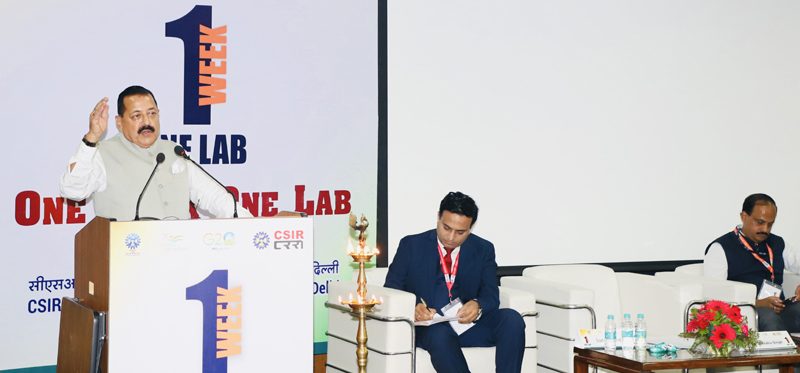
Excelsior Correspondent
NEW DELHI, July 17 : Union Minister of State (Independent Charge) Science & Technology; MoS PMO, Personnel, Public Grievances, Pensions, Atomic Energy and Space Dr Jitendra Singh today announced that India has developed the world’s latest “Steel Road” technology. He informed that CSIR- Central Road Research Institute (CRRI) , New Delhi, which was founded in 1952, has pioneered the development of a revolutionary Steel slag road technology which facilitates the large-scale utilization of waste steel slag from Steel Plants in road construction.
The Minister further disclosed that in June 2022, Surat in Gujarat became the first city in the country, or perhaps world, to get a processed steel slag (industrial waste) road built as part of a joint-venture project by the Council of Scientific and Industrial Research (CSIR), Central Road Research Institute (CRRI), Union Ministry of Steel, government think-tank NITI Ayog, and Arcelormittal Nippon Steel (AM/NS), at Hazira.
Slag is made up of impurities melted out of the ore during the steel-making process in most of the Steel Plants.
Dr Jitendra Singh said steel slag technology in paving the roads is in tune with Prime Minister Narendra Modi’s “Waste to Wealth” Mantra. “This innovative technological initiative also addresses the problem of environmental degradation caused by waste steel slag and unsustainable mining and quarrying of natural aggregates. CRRI has developed several key technologies for sustainable utilization of waste materials in road construction”, he said.
The stretch of six-lane road experimentally paved with slag from AM/NS plant has been shown to resist beating from weather as well as from thousands of heavy trucks, even though the surface is 30% shallower than that of roads paved with natural aggregates.
Slag is made up of impurities melted out of the ore during the steel-making process.
The trial, guided by the CSIR-CRRI, suggests that roads built with the abundant waste material mixed with bitumen could be 30% cheaper than conventional paving, and reduce the unsustainable mining of sand and gravel.
The Border Roads Organisation (BRO) also used steel slag to construct a long-lasting heavy-duty road at Arunachal Pradesh along the India-China border area. The steel slag material was given by Tata Steel Ltd free of cost and transported from Jamshedpur to Arunachal Pradesh by Indian Railways free of cost. Besides, India’s largest road building agency, National Highway Authority of India successfully tested the Steel Slag Road technology on NH-66 (Mumbai- Goa).
Dr Jitendra Singh, who visited the Central Road Research Institute here today, said that the steel slag road not only cost about 30% cheaper than conventional bitumen but they are also more durable and resistant to weather vagaries.
“Steel slag roads have been found to last ten years as compared to three to four years for bitumen roads, thus bringing down sharply the maintenance costs. In Surat, the steel slag road top has been found to weather the erosive saline marine environment while in the cold, snowy and torrential rain prone toughest Himalayan terrain, the steel slag roads have been found to last longer” he said.
During the visit, Dr Jitendra Singh also launched the CSIR ‘One Week One Lab’ programme. He also interacted with students being conducted on a guided tour of CRRI as part of the ‘One Week One Lab’ campaign.
Dr Jitendra Singh lauded the CRRI for partnering with the Central Electronics Engineering Research Institute (CEERI) in Pilani for an AI mission project, which seeks to harness the power of artificial intelligence in transportation systems. During the visit, the Minister inspected the Mobile Cold Mixer-cum-Paver, specifically designed for constructing roads in high-altitude regions, and the Patch Fill-Pothole Repair Machine, which enables quick and economical repairs of roads in both urban and rural areas.

